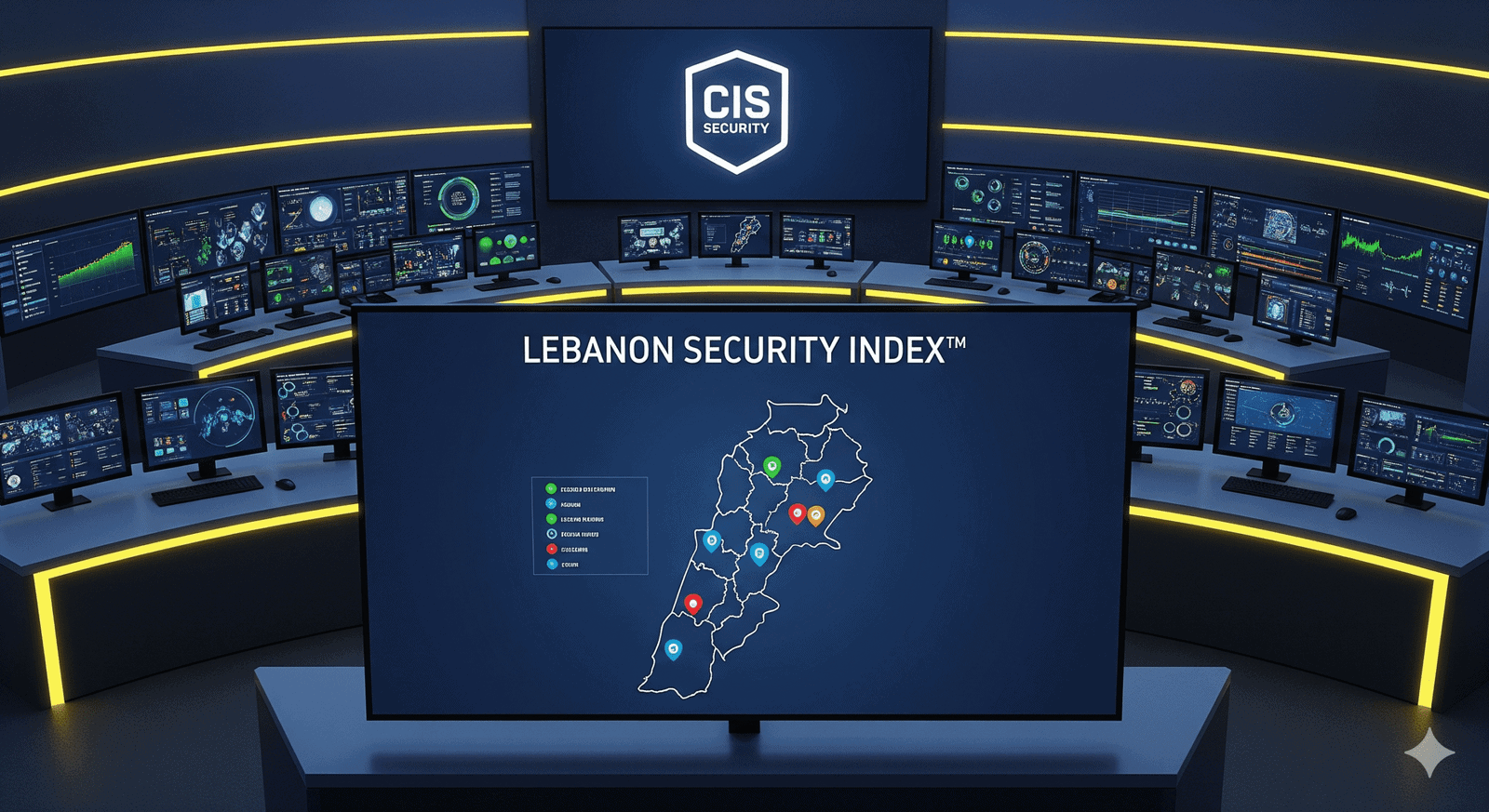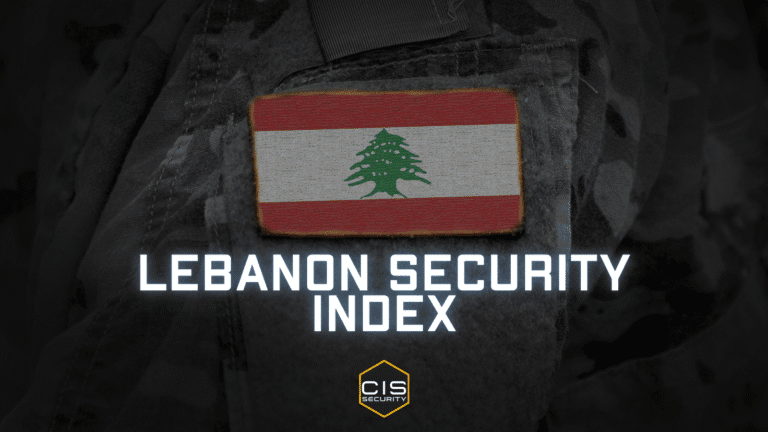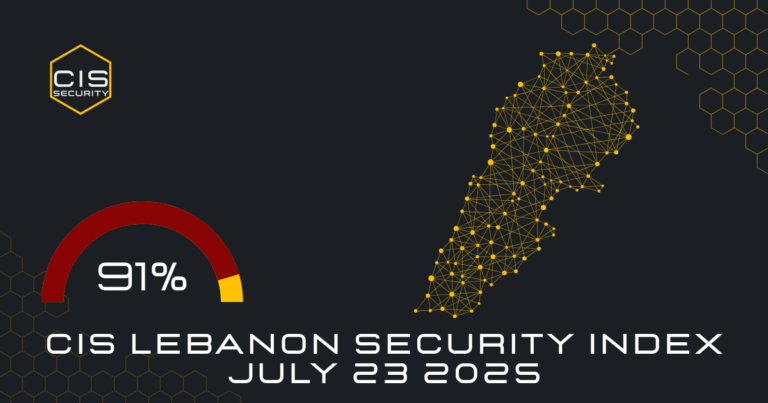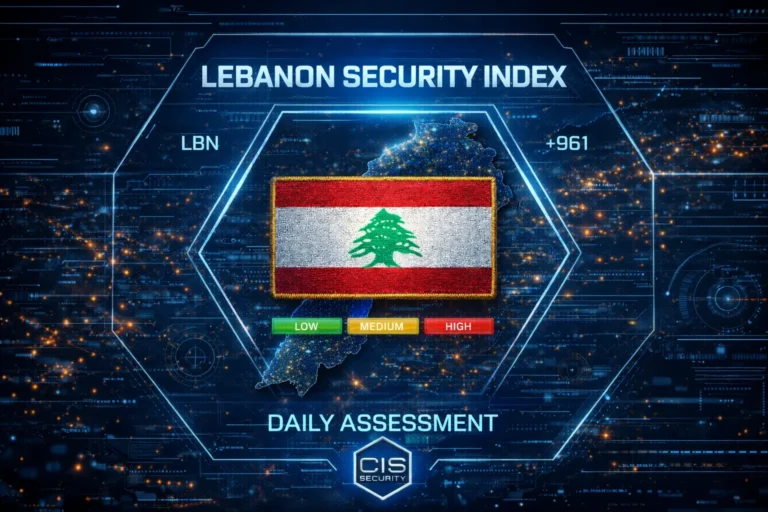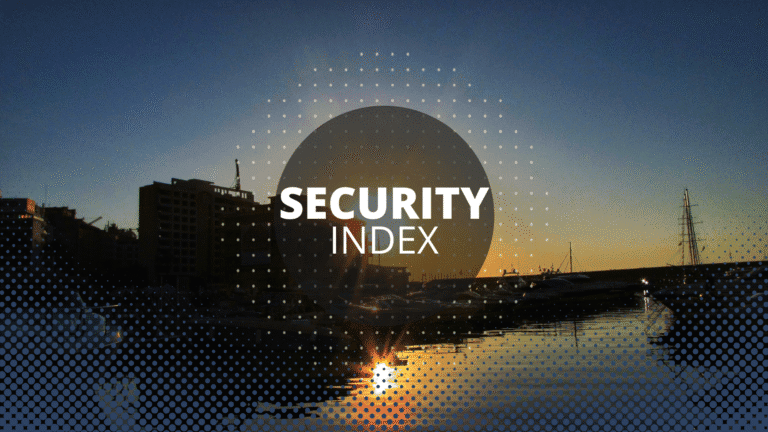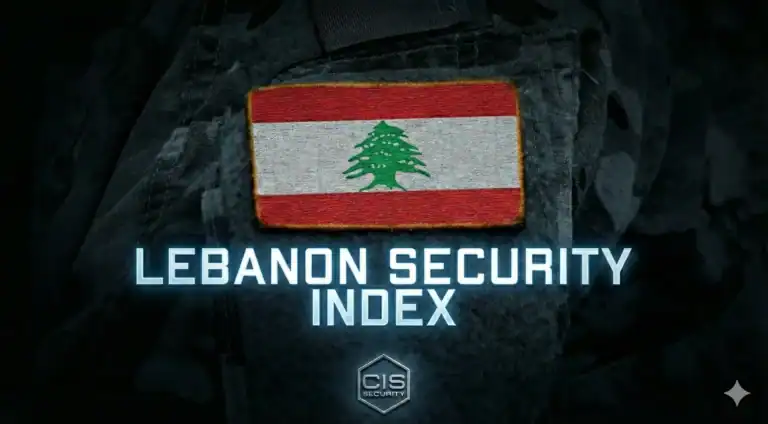CIS LEBANON SECURITY INDEX September 6 2025
CIS LEBANON SECURITY INDEX September 6 2025
CIS LEBANON SECURITY INDEX™
Live Assessment: Saturday, September 6, 2025
NATIONAL INDEX
0
LOADING
National Assessment & Trend:
VOLATILEGovernorate Breakdown
Click on a governorate to view detailed analysis.
📊 TODAY’S LEBANON SECURITY INDEX READING
INDEX LEVEL: 🔴 CRITICAL
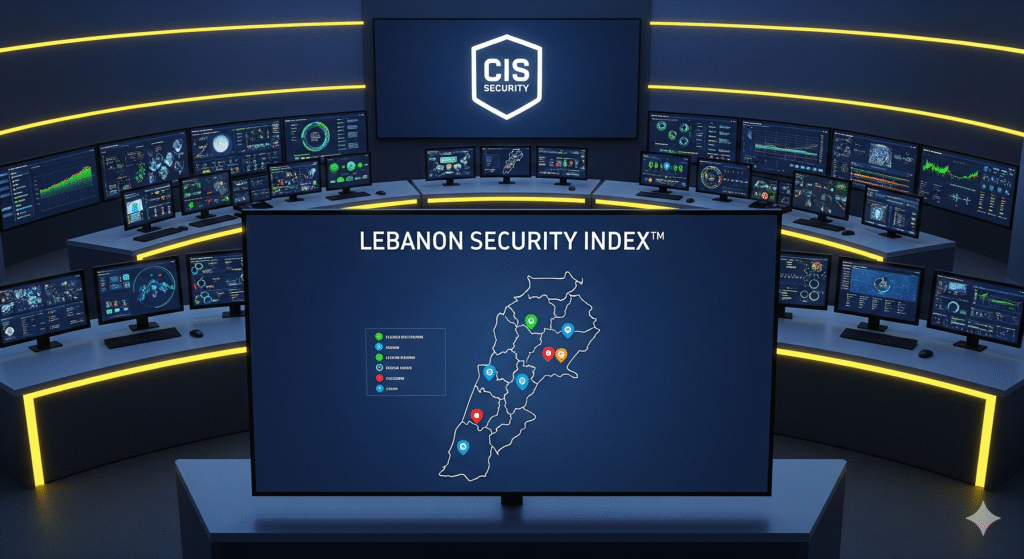
TODAY’S OVERALL INDEX: 99/100
TREND ANALYSIS: ⚡ VOLATILE
🌡️ GOVERNORATE-BY-GOVERNATE SECURITY ASSESSMENT
BEIRUT 🏙️
Index Reading: 99/100 🔴
Status: Critical. The national security and political crisis has escalated. The cabinet’s decision to endorse, but not formally approve, the army’s disarmament plan has been met with mixed reactions. While an official said it’s a step toward “wisdom and reason,” Hezbollah and its allies walked out of the meeting, signaling continued political deadlock. The risk of civil unrest remains exceptionally high, with previous protests suspended but the potential for them to resume at any moment. Security remains at its maximum around government buildings and diplomatic missions. The outcome of the cabinet meeting has not resolved the core issue and has instead created a new, uncertain phase of the crisis.
Key Factor: The failure to reach a full political consensus on the army’s disarmament plan, despite a stated government endorsement, maintains extreme political and civil confrontation risks.
MOUNT LEBANON 🏞️
Index Reading: 92/100 🔴
Status: Critical. The security situation remains volatile. The political uncertainty following the cabinet meeting has prevented a de-escalation of tensions. While widespread protests did not materialize today, the threat of civil unrest and highway blockades remains acute. The presence of armed factions and the potential for confrontations with the LAF and ISF is still a major concern, as the instability in Beirut directly impacts this region’s stability.
Key Factor: The unresolved political crisis and the potential for renewed civil unrest in response to any perceived escalation in Beirut continue to place the governorate’s stability at a critical risk.
NORTH LEBANON 🌊
Index Reading: 95/100 🔴
Status: Critical. The national political crisis continues to exacerbate existing tensions in Tripoli and the wider North Lebanon region. The deep socio-economic distress and entrenched sectarian fault lines make this area highly susceptible to being drawn into national-level civil unrest. The government’s continued focus on border security and Syrian refugee repatriation efforts maintains a high state of alert and a high potential for large-scale civil unrest.
Key Factor: The combination of active conflict risk factors and a heightened potential for large-scale civil unrest due to the intensifying national political instability.
AKKAR 🌲
Index Reading: 97/100 🔴
Status: Critical. The government’s internal paralysis continues to critically undermine the LAF’s ability to manage the extremely volatile security situation along the porous Syrian border. The reported Israeli drone strike near the border crossing with Syria continues to signal new diplomatic efforts but also continued cross-border military actions that can impact Lebanese border regions. This, along with recent skirmishes along the border, highlights the ongoing threat.
Key Factor: Extreme threat from a porous and actively contested border with Syria, severely compounded by the national political crisis and strained inter-state relations, with new reported military actions.
BEQAA VALLEY 🍇
Index Reading: 99/100 🔴
Status: Critical. The region remains an active conflict zone with a severe external military threat. The August 31 Israeli airstrikes on targets in the Beqaa Valley, reportedly a Hezbollah arms depot, continue to be a primary concern. The region is a prominent Hezbollah stronghold and a focal point of opposition to the government’s disarmament decision, making it highly volatile. The persistent, confirmed reports of Israeli drones flying over the region maintain a state of high alert.
Key Factor: Active and ongoing Israeli military threat in the broader region, compounded by high internal tensions and continued opposition to disarmament efforts, with confirmed airstrikes and persistent drone activity.
BAALBEK-HERMEL 🕌
Index Reading: 99/100 🔴
Status: Critical. This remains a primary conflict zone. The region is a Hezbollah stronghold and a central focal point of opposition to the government’s disarmament decision, making it extremely volatile both internally and externally. The escalating national crisis and Hezbollah’s firm stance against disarmament further question the LAF’s mission in the area, potentially emboldening non-state actors. The continued threat of Israeli military operations in the broader Beqaa region persists, maintaining the highest level of alert, with confirmed airstrikes in the vicinity and ongoing drone activity.
Key Factor: Assessed as a primary active conflict zone with ongoing major military operations and extremely high internal tensions.
KESERWAN-JBEIL 🏛️
Index Reading: 68/100 🟡
Status: Elevated. While this region has a lower risk profile than the active conflict zones, it is not immune to the national crisis. Israeli warplanes and drones have recently breached Lebanese airspace over Keserwan and Jbeil. Furthermore, Israeli airstrikes have hit a house in Ftouh Keserwan, marking a significant escalation. Today, there are reports of small, isolated protests in the area in solidarity with the protests in Beirut. The political and sectarian divisions that define Lebanese politics are visible here, and the potential for a rapid deterioration remains high.
Key Factor: A localized security environment that is increasingly and directly threatened by military overflights and confirmed airstrikes, reflecting the fragile national security situation.
SOUTH LEBANON 🌴
Index Reading: 99/100 🔴
Status: Critical. An active war zone. On August 28, the LAF announced that two military personnel were killed and two wounded when an Israeli drone crashed and then exploded in the Ras Al-Naqoura area. The UNIFIL peacekeepers also reported discovering a Hezbollah artillery bunker near the village of Meri on August 28. In a grave escalation on September 2, Israeli drones dropped four grenades near UNIFIL peacekeepers during a pre-coordinated road clearance operation near Marwahin. The UNIFIL has called this “one of the most serious attacks” since the ceasefire. The Lebanese army has also begun receiving heavy weapons from Palestinian factions (excluding Hamas) in six refugee camps.
Key Factor: A direct and fatal Israeli drone strike on LAF personnel, UNIFIL’s discovery of active Hezbollah military infrastructure, and a new, grave escalation with Israeli drones attacking UNIFIL peacekeepers, all contribute to an exceptionally high-risk environment.
NABATIEH ⛪
Index Reading: 99/100 🔴
Status: Critical. An active war zone. This governorate is directly impacted by the new direct LAF casualties in the neighboring Ras Al-Naqoura area. The August 31 Israeli airstrikes were reported in the Ali al-Taher highlands and the outskirts of Kfar Tibnit, causing fires and damage. This entire governorate remains a primary theater for Israeli military operations and is directly impacted by the political and security fallout from the Wadi Zibqin incident, as well as the broader national disarmament crisis and explicit threats of internal conflict.
Key Factor: Direct LAF casualties in the immediate vicinity, a new direct attack on UNIFIL peacekeepers, strategic importance for non-state actors making it a central front for ongoing hostilities and civil unrest, compounded by recent and continued Israeli military actions.
🎯 TODAY’S SECURITY INTELLIGENCE BRIEF
🔥 HIGH-RISK AREAS TO MONITOR:
Location 1: Beirut, particularly areas around government buildings and diplomatic missions (especially the U.S. Embassy), due to the UNIFIL mandate resolution, continued US pressure, and the ongoing cabinet meeting.
Location 2: The Beqaa Valley and Nabatieh governorates, following the Israeli airstrikes on August 31 and persistent drone activity.
Location 3: The Syrian-Lebanon border, due to the formation of new joint committees and continued risk of illicit cross-border activities.
Location 4: Ras Al-Naqoura area (South Lebanon), following the direct and fatal Israeli drone strike on LAF personnel on August 28.
Location 5: Southern Lebanon generally, following the Amnesty International report on widespread destruction and calls for a war crimes investigation, and the September 2 direct attack on UNIFIL forces.
Location 6: Wadi Zibqin (Tyre District) and surrounding areas, as the LAF investigation into the deadly August 9 explosion continues amidst rising internal tensions and questions about external involvement.
Location 7: Khallat al-Makhafir (South Lebanon), due to the confirmed and ongoing construction of a new Israeli military post inside Lebanese territory.
✅ RELATIVELY LOWER-RISK ZONES (WITH EXTREME CAUTION):
Area 1: The Jbeil (Byblos) and Batroun coastal cities. Caveat: Stability is not guaranteed and highly vulnerable to a nationwide escalation.
Area 2: The Metn district’s primary residential and commercial zones. Caveat: Subject to significant risks from a nationwide escalation and potential spillover.
Area 3: Beirut Central District. Caveat: Avoid all demonstrations, maintain extreme awareness of opportunistic crime, and be prepared for rapid security deterioration.
⚠️ AVOID TODAY:
DO NOT TRAVEL TO LEBANON. The security situation is extremely volatile and has further deteriorated with direct LAF casualties and a new, direct attack on UNIFIL peacekeepers. All governments continue to advise against travel due to the risk of a sudden, country-wide conflict escalation or a complete breakdown of civil order.
All non-essential travel to South Lebanon, Nabatieh, Baalbek-Hermel, Beqaa, Akkar, and Tripoli governorates.
Any non-essential movement. The risk of internal clashes, in addition to ongoing Israeli military operations, is now significantly higher and more explicit.
📱 PROFESSIONAL SECURITY GUIDANCE
🏠 FOR RESIDENTS:
The direct LAF casualties from an Israeli drone strike, coupled with a new direct attack on UNIFIL peacekeepers and the UN Security Council’s decision on UNIFIL’s mandate and ongoing political standoff, means the risk of internal and external conflict is exceptionally high. Prepare for an imminent, rapid, and severe deterioration of the security situation.
Show extreme caution and respect around any military processions or mourning events. Avoid any public discussions about the Wadi Zibqin incident, which is a matter of extreme national sensitivity and currently under intense scrutiny.
Maintain emergency supplies (food, water, medicine) and a “go-bag” with essential documents.
Know the location of the nearest shelter and have a shelter-in-place plan.
🏢 FOR BUSINESSES:
Immediately suspend all non-essential operations. The current crisis poses a severe and immediate threat to staff movement and operational continuity.
Review and test emergency plans for evacuation and sheltering in place. Establish clear communication protocols and alert systems for all staff.
The political paralysis and ongoing unrest will impact all administrative functions and services. Be prepared for potential disruptions to infrastructure and services.
🚗 FOR TRAVELERS:
DO NOT TRAVEL TO LEBANON. Multiple governments advise their citizens not to travel to Lebanon and have stated that their ability to provide consular assistance or evacuation is extremely limited. Commercial flights may be cancelled and the airport could close without notice. The situation is too dangerous.
🔮 24-HOUR SECURITY FORECAST
Predicted Index Reading: 99/100
Forecast Trend: ⚡ VOLATILE
Expected Factors: The outcome of the ongoing cabinet meeting will be the most significant factor. The country remains in a state of severe political crisis, intensified by the direct LAF casualties and a new, direct attack on UNIFIL peacekeepers. The implications of the UN Security Council’s final UNIFIL mandate extension and eventual withdrawal will unfold. Persistent Israeli military activity, including drone strikes and border incidents, are anticipated.
Preparation Recommendation: All residents and organizations must maintain a maximum state of alert and be prepared for an imminent and severe escalation of the security situation, including potential internal clashes.
📊 WEEKLY SECURITY ANALYSIS
This Week’s Average: 98/100
Change from Last Week: +5 points (significant increase due to new LAF casualties, the UNIFIL decision, confirmed Israeli airstrikes, and a new direct attack on UN peacekeepers).
Monthly Trend: Rapidly Deteriorating
Seasonal Assessment: The security environment is now defined by a dual crisis: an active external conflict with Israel, significantly escalated by direct and fatal engagement with the Lebanese Armed Forces and the discovery of active military infrastructure and a direct attack on UNIFIL peacekeepers; and a severe internal confrontation that has placed the state’s most respected institution at the center of the conflict, now with the added complexity of the UNIFIL mandate’s final extension and stalled talks on disarmament.
🛡️ CIS SECURITY: LEBANON’S PREMIER SECURITY SOLUTIONS
Since 1990, CIS Security has stood as Lebanon’s leading provider of comprehensive security services, extending robust protection across all nine governorates. With over three decades of unparalleled experience, our highly trained, uniformed, and licensed security personnel define industry excellence. Each guard undergoes rigorous training in threat assessment, swift emergency response, cutting-edge surveillance, and cultural awareness, ensuring seamless and professional safeguarding in diverse settings.
Our dedicated team offers a crucial first line of defense for enterprises, residential complexes, and prominent individuals. From the vibrant heart of Beirut to the vital border areas of South Lebanon and Nabatieh, our guards maintain unyielding vigilance, delivering both overt deterrence and discreet, client-specific protection. Our operations are fortified by a 24/7 operational command center and nationwide rapid response units, guaranteeing steadfast reliability.
In a constantly shifting security environment, CIS Security leads through innovation. We consistently upgrade our protocols, broaden our service array, and refine our training to counter evolving challenges. Our achievements are reflected not just in client safety, but in our wider contribution to Lebanon’s security framework, collaborating with state agencies while delivering top-tier private security.
Choose Lebanon’s most seasoned security experts. Reach out to us at +961-3-539900 or explore www.cissecurity.net today to strengthen your personal, home, or business security with the proven dependability and expertise cultivated over decades of committed service.

